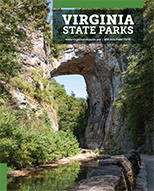Read Our Blogs
Volunteering can open doors for the future
There are many different reasons people choose to volunteer. Some volunteer because they have a specific interest or want to give back to their community, while others volunteer for school or group credits. Sometimes, the time spent volunteering ends up launching their future career. Virginia State Parks has several previous volunteers who have committed to full-time employment.
Dustin Haymaker
Dustin Haymaker, for instance, began volunteering as a teen in 2000 and is now the park manager at Shenandoah River State Park. Growing up, Dustin’s family lived near Hungry Mother State Park. He spent time working in the park’s Discovery Center, welcoming guests to the park. Dustin says, “The biggest lesson at Hungry Mother was how to interact with people as a contact ranger. You have to meet people from all walks of life and find ways to help them have their best experience at the park.” The park became a way of life for the whole Haymaker family. Along with Dustin, his brothers, sister and father all worked at Hungry Mother State Park.
As soon as he was old enough, Dustin started with the Youth Conservation Corps (YCC) through Virginia State Parks. YCC is a residential program consisting of work projects during weekdays and environmental education and adventure opportunities on weeknights and weekends. Dustin served as a crew leader for five years. “My first experience with leadership was as a crew supervisor. Unknown to me at the time, the challenges with personnel, budgeting and trail construction while with the YCC were invaluable to my future career. Not only had my time volunteering helped with my career in the military and private business up to that point, but it continued to help me even years later when I returned to Virginia.”

Dustin Haymaker
Andrew Stern
For Andrew Stern, current assistant park manager at Grayson Highlands State Park, the experience was more unique. “I was 17 years old when I began volunteering as a first-person reenactor/interpreter. We had family friends who attended prior events at Wilderness Road State Park and had assisted in the initial construction of the fort. They were so adamant we needed to be there that they practically dragged us to the park! Their enthusiasm for the historical accuracy of the site, the stories about the battle reenactment, and programming sounded amazing.” Andrew recalls, “That first year, my dad and I were recruited by interpretive ranger Herman Stainbrook (Capt. Ebenezer Titus) to assist in the color guard ceremony to begin the event Saturday morning. Two years later, I was attending college fifteen minutes down the road at Lincoln Memorial University and was attending the monthly volunteer events.”
When asked what lessons he learned, Stern answered, “It is hard for me to narrow it down, but I think there were two big lessons I learned while volunteering."
Lesson 1: Never stop learning.
Park Interpreter Herman Stainbrook (Capt. Titus) always encouraged us to never stop learning. He pushed us as volunteers and later as staff to always continue researching and developing our personas as historical interpreters. Holding a high standard for our programs, ensuring the historical accuracy in our attire, and taking pride in the site really shows.
Lesson 2: Don’t lose your passion.
It always amazed me while on cannon crew that at the end of a long day in the 90-plus degree heat and absolutely sweltering humidity, Richard Beeler (Sgt. Hord) never slowed down. In fact, each program somehow progressively would get a little longer as he remembered additional pieces of knowledge to impart to our guests.
Stern remembers, “For me, the best part of being a volunteer at Wilderness Roads/ Historic Martin’s Station was feeling like you were part of the community, part of the family. There were people you only saw there once a year and you would pick up right where you left off each time you saw them. Some of my best lifelong friends I met while as a volunteer. You regularly see families with as many as three generations, all coming together to volunteer at these events. I’d challenge you to find other opportunities that bring together families like that.”


Andrew Stern
Ethan Howe
Ethan Howe is now at Natural Tunnel State Park as the chief ranger of visitor experience. He grew up vacationing with his family in national parks and started with Virginia State Parks through an AmeriCorps assignment at False Cape State Park. The AmeriCorps programs were designed to help with interpretation and programs at the parks. Ethan not only served in Virginia State Parks but United Way in Alaska as well. “The whole summer at False Cape was amazing but camping on the beach and waking up to watch the sunrise with no one else around will always stick in my mind,” said Howe.
“During my second term with AmeriCorps, I began to realize how comfortable and natural it felt to be a park ranger. I realized how important it was for my grandfather to share the special spaces with my family and the impact of my granduncle's work to protect Maine's resources. I wanted to make sure I could share Virginia's special spaces and help protect our natural, cultural, and historical resources for future generations.”
Ethan states, “The best lesson I learned from my service terms was that something that I take as a normal occurrence can have a major impact on someone else. Just because I see dragonflies or crayfish every day, it might be the first time someone else has had the chance to experience them.”

Ethan Howe
If you would like to begin your journey as a volunteer at Virginia State Parks, visit our website or contact the park directly.
If you have read the article and have a question, please email nancy.heltman@dcr.virginia.gov.














